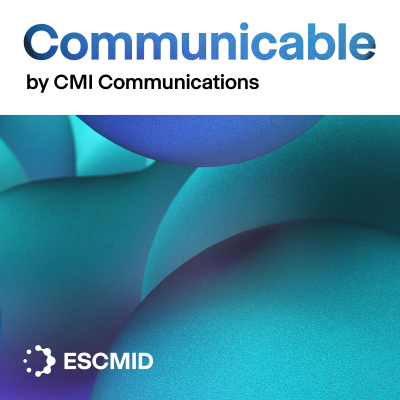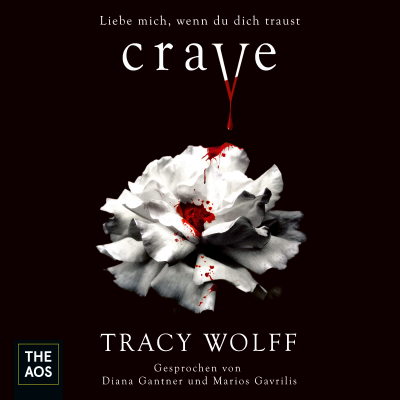
Communicable
Podcast von CMI Communications
Communicable takes on hot topics in infectious diseases and clinical microbiology. Hosted by the editors of CMI Communications, the open-access journa...
Kostenlos testen für 30 Tage
Nach der Testphase nur 4,99 € / Monat.Jederzeit kündbar.
Alle Folgen
15 FolgenWastewater surveillance is a powerful epidemiological tool that “mirrors our life,” and has gained wide attention in recent years due to its application during the COVID-19 pandemic. The hosts this week, Drs. Navaneeth Narayanan and Emily McDonald, are joined by two wastewater surveillance experts, Dr. Nasreen Hassoun-Kheir of Geneva University Hospitals, a WHO Collaborating Centre on antimicrobial resistance (AMR), as well as Professor David Graham of Newcastle University, United Kingdom, to discuss how this surveillance method—as well as a multidisciplinary approach—are central to understanding community health, infection control and pandemic preparedness. This episode was edited by Kathryn Hostettler and peer reviewed by Dr. James Donnelly of the Royal College of Surgeons in Ireland (RCSI), Dublin, Ireland. Literature UN Environment Programme (UNEP), Bracing for superbugs (2023) https://www.unep.org/resources/superbugs/environmental-action [https://www.unep.org/resources/superbugs/environmental-action] Hassoun-Kheir N, et al. EMBRACE-WATERS statement (2021). doi:10.1016/j.onehlt.2021.100339 [https://doi.org/10.1016/j.onehlt.2021.100339] Hassoun-Kheir N, et al. Systematic review (2020). doi: 10.1016/j.scitotenv.2020.140804 [https://doi.org/10.1016/j.scitotenv.2020.140804] Trask JD, et al. (1942). https://pmc.ncbi.nlm.nih.gov/articles/PMC2135222/ [https://pmc.ncbi.nlm.nih.gov/articles/PMC2135222/] Chapters * (00:00) - Introduction * (03:03) - Icebreaker question * (08:33) - What is wastewater surveillance (WWS)? * (12:47) - How does WWS relate to infection surveillance? * (16:57) - WWS & pandemic preparedness * (21:09) - Is the data accessible to the public? * (25:10) - WWS uses in healthcare settings & mass health: what it can and cannot answer * (43:00) - What's next for WWS: experts' picks * (48:33) - Take-home messages
Substandard and falsified (SF) antimicrobials are a neglected global health problem and have been implicated as drivers of antimicrobial resistance (AMR). Substandard medicines are authorized medical products that fail to meet either their quality standards or their specifications, whereas falsified medicines are those that deliberately and fraudulently misrepresent their identity, composition or source. Host Angela Huttner is joined by Pernette Bourdillon Esteve, Technical Officer for the World Health Organization’s Substandard/falsified Medical Products group, and Ben Cooper, epidemiologist at Oxford University and head of its Drug-Resistant Infection and Disease Dynamics (DRIaDD), to explore the effects of SF antimicrobials on people and AMR. This episode was edited by Kathryn Hostettler and peer-reviewed by Dr. Arjana Zerja of Mother Teresa University Hospital in Tirana, Albania. Literature Cavany S et al. Nat Commun 14, 6153 (2023). doi: 10.1038/s41467-023-41542-w [https://doi.org/10.1038/s41467-023-41542-w] WHO Global Surveillance and Monitoring System for substandard and falsified medical products (2017). https://www.who.int/publications/i/item/9789241513425 [https://www.who.int/publications/i/item/9789241513425]
The market of predatory publishing is as lucrative as it is unethical. Predatory journals are disguised as legitimate entities, and prey on both early-career academics and the naïve. In this episode of Communicable, hosts Angela Huttner and Marc Bonten are joined by Editors-in-chief Ursula Hofer (Lancet Infect Dis) and Leonard Leibovici (CMI) to discuss the various schemes of the ‘Wild West’ of publishing, and how to avoid them. This episode was edited by Kathryn Hostettler and peer-reviewed by Dr. Özlem Türkmen Recen, Izmir Public Health Laboratory, Izmir, Türkiye. Literature Research4Life https://www.research4life.org/ [https://www.research4life.org/] Benedictus R et al. Nature 2016 https://www.nature.com/articles/538453a [https://www.nature.com/articles/538453a]
Enterococci are commensal microbes, part of the healthy microflora populating the human gut. But they are also opportunistic pathogens and notorious nosocomial agents with intrinsic traits that promote their pathogenesis and make them difficult to kill. In the third instalment of the Nightmare Series, hosts Angela Huttner and Thomas Tängdén are joined by enterococcal experts Kimberly Kline (University of Geneva) and Louis Rice (Brown University) to discuss what make vancomycin-resistant enterococci, or VRE, such a clinical nightmare. Enterococcus faecalis and Enterococcus faecium are the focus. This episode was edited by Kathryn Hostettler and peer-reviewed by Dr. Nunzia Esposito of the University of Naples Federico II, Naples, Italy. Literature Stellfox ME et al. J Antimicrob Chemother 14 Feb 2024. doi: 10.1128/mbio.03396-23 [https://journals.asm.org/doi/10.1128/mbio.03396-23] Rogers R & Rice LB. Clin Infect Dis 15 Jan 2024. doi: 10.1093/cid/ciad613 [https://doi.org/10.1093/cid/ciad613] Lebreton F et al. Cell 18 May 2017. doi: 10.1016/j.cell.2017.04.027 [https://doi.org/10.1016/j.cell.2017.04.027] Donskey CJ et al. N Engl J Med 28 Dec 2000. doi: 10.1056/NEJM200012283432604 [https://doi.org/10.1056/nejm200012283432604]
Carbapenemase producers are a nightmare for clinicians. Not only are they resistant to carbapenems, a last resort β-lactam antibiotic, they are notorious for developing multidrug and pandrug resistances resulting in limited to no treatment options. In this episode of Communicable, hosts Angela Huttner and Thomas Tängdén sit down with Dr. David Paterson (National University of Singapore) and Dr. Souha Kanj (American University of Beirut Medical Center, Lebanon), two ID physicians from regions where carbapenem-resistant Enterobacteriaceae or CRE, and carbapenem-resistant Acinetobacter are widespread. The episode begins with the history and emergence of CRE and reviews current epidemiology, diagnosis (including the Ambler classification of β-lactamases) and treatment options. Lessons and insights from personal experiences are shared to reflect the current clinical challenges caused by carbapenem-resistant bacteria and the importance of infection prevention and control measures to mitigate further spread. This episode was edited by Kathryn Hostettler and peer-reviewed by Dr. Filippo Medioli of Policlinico di Modena, Italy. For more related content on the WHO Priority Pathogens List and new antibiotics in the pipeline, check out our previous episodes, Communicable E3 and E10 (see Literature). Literature Communicable E3 - The New WHO Priority Pathogens List: which bugs to target first? June 2024. https://communicable.transistor.fm/episodes/communicable-e3-the-new-who-priority-pathogens-list-which-bacteria-to-target-first [https://communicable.transistor.fm/episodes/communicable-e3-the-new-who-priority-pathogens-list-which-bacteria-to-target-first] Communicable E10 - Pipeline update: new antibiotics & other antimicrobials that you might actually use. Sep 2024. https://communicable.transistor.fm/episodes/communicable-e10-pipeline-update-new-antibiotics-other-antimicrobials-that-you-might-actually-use [https://communicable.transistor.fm/episodes/communicable-e10-pipeline-update-new-antibiotics-other-antimicrobials-that-you-might-actually-use] Wagenlehner FM, et al. Cefepime-Taniborbactam in Complicated Urinary Tract Infection. N Engl J Med 2024 Feb. doi: 10.1056/NEJMoa2304748 [https://doi.org/10.1056/nejmoa2304748] Cohn J, et al. Accelerating antibiotic access and stewardship: a new model to safeguard public health. Lancet Infect Dis 2024 Sep. doi: 10.1016/S1473-3099(24)00070-7 [https://doi.org/10.1016/s1473-3099(24)00070-7] Timsit JF, et al. When should I start broad-spectrum antibiotics? Intensive Care Med 2024 Sep. doi: 10.1007/s00134-024-07654-7 [https://doi.org/10.1007/s00134-024-07654-7] Paterson DL. Antibacterial agents active against Gram Negative Bacilli in phase I, II, or III clinical trials. Expert Opin Investig Drugs 2024 Apr. doi: 10.1080/13543784.2024.2326028 [https://doi.org/10.1080/13543784.2024.2326028]
Nutze Podimo überall
Höre Podimo auf deinem Smartphone, Tablet, Computer oder im Auto!
Ein ganzes Universum für Unterhaltung für die Ohren
Tausende Hörbücher und exklusive Podcasts
Ohne Werbung
Verschwende keine Zeit mit Werbeunterbrechungen, wenn du bei Podimo hörst
Kostenlos testen für 30 Tage
Nach der Testphase nur 4,99 € / Monat.Jederzeit kündbar.
Exklusive Podcasts
Werbefrei
Nicht-Podimo-Podcasts
Hörbücher
20 Stunden / Monat

































